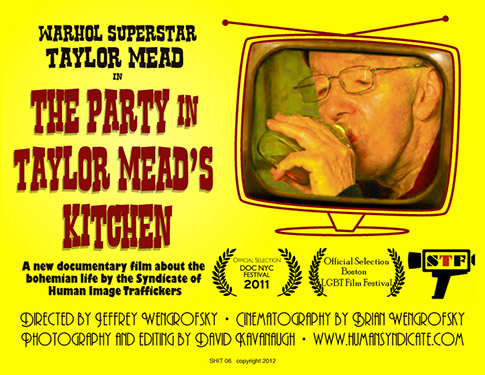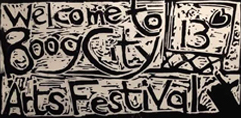


The Party in Taylor Mead’s Kitchen, the first of the Syndicate’s films to be released to festivals, had its official premier at Doc NYC in New York University’s 400-seat Kimmel Auditorium on November 6, 2011. It has since screened coast-to-coast and internationally.
The Party in Taylor Mead’s Kitchen
After reading Jack Kerouac’s On the Road, Taylor Mead, the scion of Michigan’s Democratic Party political boss Harry Mead, left his Grosse Point home and Merrill Lynch sinecure for a life hitchhiking the US. Upon arriving in San Francisco, his ability to write and perform clever, bawdy, homoerotic poems made Taylor an instant hit with the Beatnik scene. He soon came to personify the “Beatnik” ethic in Ron Rice’s classic film, The Flower Thief, in 1960. After meeting Allen Ginsberg at a poetry function, Taylor moved to the Lower East Side of New York, then the Beatnik capital of the world. Taylor was soon a Warhol superstar and came to be featured, most famously, in Tarzan and Jane Revisited…Sort of, and most notoriously, as the star of Taylor Mead’s Ass in 1964. He acted in scores of films, acted for the stage, and published three books of poetry.
Fifty-one years after trading in upper-crust luxury for bohemian art stardom, The Party in Taylor Mead’s Kitchen finds Taylor still living the life of poetry, painting, partying, acting, homoeroticism, gossip, modest living, and indifference to bourgeois notions of hygiene. We visit the octogenarian in his Lower East Side grotto to find him still brilliant, boyishly cute, and ready to party at noon. The Party in Taylor Mead’s Kitchen depicts the romantic beauty and squalid dereliction of the bohemian life while dishing the dirt on Andy Warhol, Jack Kerouac, Tennessee Williams, Ron Rice, Woody Allen, and Tallulah Bankhead. Taylor Mead was an ambassador of bohemianism from a world without the internet, cable television, surveillance cameras, cell phones, global positioning systems, credit cards or roach spray.
After a prolonged legal battle with a landlord, Taylor was forced to leave his home. Within two weeks of leaving New York City, he had a stroke and, faced with the cruel choice of spending the rest of his days paralyzed in a hospital bed, he chose instead to pass from this existence via morphine drip. Whether his legal battle and subsequent displacement played a role in his demise is anyone’s guess, but it surely did not make his life more pleasurable. It seems a pity that we, as a society, could not have treated him better. Taylor was generous with his person, abundantly charming, relentlessly funny — the ultimate late-night drinking companion. He is sorely missed and remembered lovingly.
The Syndicate of Human Image Traffickers mourns the death of Taylor Mead (December 31, 1924 – May 8, 2013).



